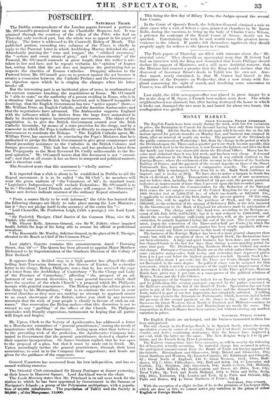POSTSCRIPT.
' SATURDAY NIGITT.
. The Dublin correspondents of the London papers forward a portion of -Mr. O'Connell's promised letter on the Charitable Bequests Act. It was obtained through the courtesy of the editor of the Pilot; who had on Thursday only received part, but the whole was to appear in his paper of Friday. - The letter is addressed to Dr: Cantwell, Bishop of Meath. This published portion, exceeding two columns of the Times, is chiefly in reply to the Pastoral letter in which Archbishop Murray defended the act. Abundantly praising the "tone and temper," the "subdued sweetness," the "serious and sweet strain of piety," and " obvious sincerity" of the Pastoral, Mr. O'Connell contends at great length that the writer is mis- taken in law and fact; and he repeats verbatim his " opinion" of August last, setting forth that the act does not improve the preexisting law as respects the charities of Roman Catholics. Dropping allusion to the Pastoral letter, Mr. O'Connell goes on to protest against the act because it creates a connexion between the Catholic Prelates and the Government- = objection upon which he is ringing the changes when his letter breaks off.
But the interesting part is an incidental piece of news, in confirmation of the current rumours touching the negotiations at Rome. Mr. O'Connell Is "able to state," on the authority of a person residing in Rome, who is in a situation that precludes his being deceived, and is himself incapable of deceiving, that the English Government has two "active agents" there,— -Mr. William Petre, an English Catholic, and the Austrian Ambassador; and that the negotiations have advanced. The Ambassador supports England with the influence which he derives from the large force maintained in Italy by Austria to repress insurrectionary movements. The object of the negotiation is to give the British Government control over the Irish Catholic hierarchy, by means of a state provision for the clergy, and by a concordat in which the Pope is indirectly or directly to empower the British 'Government to nominate the Bishops. " The English Catholic agent, Mr. William Petre, has succeeded in convincing the Pope's Ministers that he is authorized to pledge the British Government to give great countenance and liberal pecuniary assistance to the Catholics in the British Colonies and foreign possessions. This bait has taken, and has produced a letter from the Propaganda to the Most Reverend Dr. Crolly unfavourable to the Re- peal agitation." Mr. O'Connell insists that this document is not " canoni- -cal"; and that at all events it has no force in temporal and political matters, and is therefore void.
The Standard avers that this statement is "wholly untrue."
It is reported that a club is about to be established in Dublin to aid the Repeal movement : it is to be called "the '82 Club"; its members will wear the green uniform of "the Volunteers of '45"; its standard toast, "Legislative Independence," will. exclude Federalists; Mr. O'Connell is to be its " President," Lord Ffrench and others will compose its "Directory." These new devices indicate mistrust of the ordinary Repeal stimulants.


























 Previous page
Previous page